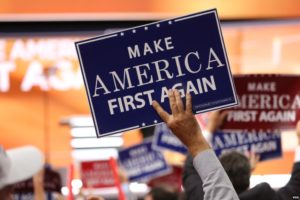Poor Excuses: The Relationship between Poverty and White Nationalism

In his infamous “fine people on both sides” press conference following the tragic events in Charlottesville, Virginia, President Trump offered a solution for America’s persistent struggle with racial violence. “If we continue to create jobs — over a million —I think that’s going to have a tremendous impact… on race relations.”
Though often decried for his insensitivity toward minority groups, yesterday’s announcement to halt the Deferred Action for Childhood Arrivals (DACA) program being one of the most egregious examples, in the statement quoted above, Trump highlighted an overlooked component of racial and anti-immigrant violence—the relationship between poverty and nationalism.
Of course, the twentieth century provided a glaring example of nationalism born of economic insecurity with the rise of Nazi Germany. (Eerily, on September 4, 1942, the Nazis ordered most children under ten to be deported.)
Feeding off the nationalist anger from economic sanctions levied on Germany after World War I, the Nazis rose to power on a platform that blamed foreigners and immigrants—primarily Jews—for Germany’s destitution.
Currently, the US is witnessing its own form of ethnocentric and anti-immigrant nationalism, one driven by a confluence of economic events that have produced an existential anxiety in white-working class Americans.
As the world has become increasingly globalized, economic sectors like the steel and auto industry have moved overseas or become mechanized, disproportionately affecting white-working class Americans who now find themselves unemployed and without a higher education.
Additionally, the sluggish recovery from the 2008 economic recession has significantly impacted the white-working class. In the beginning days of the crash, the federal government infused billions of dollars into the economy, bailing out the auto industry and creating jobs using stimulus funds.
However, the slow pace of the recovery, punctuated by an expanding wealth-gap, has punished lower and middle class workers. According to the US Bureau of Labor Statistics, the total yearly increase in earnings since 2007 has been one percent, and just .03 percent since 1979, meaning that roughly half of wage-earners, many who are part of the white-working class, are performing less well than their parents.
Moreover, as globalization and income inequality have expanded, the white-working class has seen their quality of life decrease. For example, whites are more likely to be employed in the declining manufacturing sector and live in areas devastated by deindustrialization. With few job opportunities, and little education to fall back on, the effects on white-working class communities have been dire.
Between 1978 and 1998, the mortality rate for whites aged forty-five to fifty-four dropped 2 percent per year. The reasons for the increased death rate are not typical—including suicide, alcohol and drug overdoses, and alcohol-related liver disease—and likely result from the psychological effects of poverty and the impact of perceived personal and vocational failure.
It is these psychological effects, borne of globalization and the 2008 crash, that have contributed to the emergence of white nationalism in the US.
As factory jobs continue to be shipped overseas, a common refrain among the white-working class has been to blame foreigners and immigrants for the absence of well-paying jobs, resulting in reactionary conduct centered on economic nativism and anti-immigrant rhetoric.
Additionally, the decline of the white middle-class has been punctuated by the increased prosperity of minority groups. Last month on NBC’s Meet the Press, former Atlanta mayor and civil rights leader Andrew Young said that he was “uncomfortable” condemning Ku Klux Klan members, as they are the “forgotten” and among the “poorest of the poor”. As they see progress in minority communities, Young said, the white-working class’ frustration becomes exacerbated and manifests as nationalist indignation.
In all, the historical cycle of nationalist movements includes a common element—backlash by an impoverished and self-professed “native” ethnic group against those regarded as cultural invaders and unjustly prosperous. One reason for such a reaction is the human condition itself, which compels us to feel shame in the wake of personal failure, and to blame others for our tribulations.
However, poverty-based despair does not excuse the message or conduct of white nationalist movements in the US—many of which espouse racism and xenophobia that open old wounds and divide the country.
But it is important to recognize poverty as a contributor to nationalism in America. To pacify these nativist movements, and prevent race-related conflict, public policy should focus on economic solutions to elevate struggling Americans before they resort to xenophobic violence to cure their destitution.
This includes acknowledging Trump’s push for more jobs (here’s hoping he doesn’t ignore the potential of those involving clean energy), along with the importance of providing training applicable to today’s economy and offering social programs that provide the “poorest of the poor” with a reason to feel some hope.
